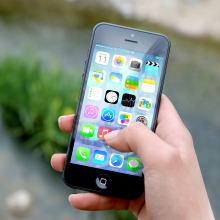It's said that taxi drivers' brains have increased growth in certain areas from navigating around cities. Is increasing smartphone use having a similar effect on other parts of our brains?
In this episode

00:00 - Are smartphones changing our brains?
Are smartphones changing our brains?
Are smartphones changing our brains? If so, how and is it a permenant change? We put these questions to Zurich University neuroscientist Professor Arko Ghosh...
Arko - If you take the brain of a London taxi driver, regions associated with memory are on average, bigger than the general population even when compared to bus drivers who navigate on more constrained routes. Our brains are very flexible and can allocate their resources depending on our experiences. This can be very specific. For instance, concert violinists who grew up playing the instrument have higher activity in the part of the brain linked to the little finger of the non-bowing hand but not of the bowing hand.
Danielle - Estimates suggests that more than a third of world's population will own a smartphone by 2017. What is in store for this growing smartphone community? Are we also changing our brains like the taxi drivers or violinists?
Arko - We recently found that the part of the brain that receives information from the thumb generates more electrical activity in people who use touchscreen phones compared to old fashioned phone users. We think this brain difference reflects the heavy reliance on the thumb in the more modern users.
Danielle - Hold the phone! How soon before our smartphones have an impact on our brain and is it permanent?
Arko - These changes seem to occur rather quickly, immediately falling a period of say, intense texting. The brain area that receives information from the thumb becomes more active. So, do not think these brain changes are permanent. In fact, we believe that the brain is continuously updated according to how we use our thumbs. This activity is likely to tail off after a period of non-use. Possibly taking a few weeks to revert back to normal. But we don't fully understand this as yet.
Danielle - It's good to know your brain does go back to normal after a phone detox, but is this change something we need to be worried about in the first place?
Arko - Every time you thumb through your phone, you do change your brain a little. But it is too early to say if this is something to be concerned about. We have a lot to learn about how the ever-changing brain impacts our behaviour in general.
Danielle - So, our interactions with our smartphones are shaping the way our brains work and respond. With always increasing possibilities of new technology, it looks like our brain will be changing for as long as our futures last. But we still have a lot to understand about how and why this is happening.
Arko - In fact, smartphones offer a beautiful opportunity to understand how our brains are shaped by our daily lives as the day to day behaviour is seamlessly stored into the phone logs.
Danielle - A big thumbs up to Arko, that brain tingling answer. Next week, we'll be releaving ourselves of this question sent in from Johannes...
Johannes - Why is it that I want to urinate more frequently in colder weather?










Comments
Add a comment